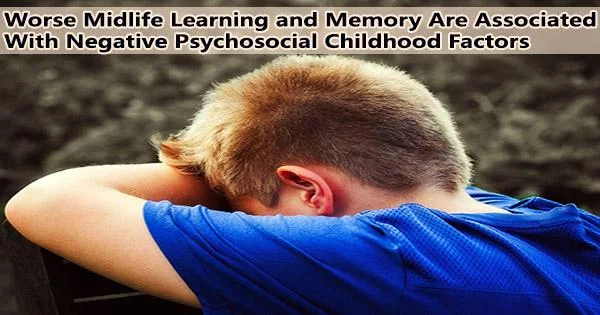According to a Finnish study directed by the Centre for Population Health Research at the University of Turku, a child’s self-control and social adjustment are particularly affected by cumulative negative psychosocial factors in childhood, which are linked to worse learning and memory in adulthood.
Along with the aging population, the prevalence of cognitive deficits is growing. Determining the impact of different exposures beginning in childhood is crucial in order to developing methods for promoting cognitive health.
An unfavorable psychosocial environment during childhood may hinder cognitive development, however, it is yet unclear how these factors relate to adult cognitive performance. According to the findings of a long-term Finnish study, adverse psychosocial childhood conditions may contribute to midlife learning and memory declines.
“Previous evidence on adverse psychosocial factors and cognitive outcomes comes mainly from either short-term or retrospective long-term studies focusing on single psychosocial factor or adversity. This study is one of the first prospective longitudinal studies focusing on the associations between multiple childhood psychosocial factors and adulthood cognitive function,” says Doctoral Researcher Amanda Nurmi from the Centre for Population Health Research at the University of Turku and Turku University Hospital.
The results of our study can be leveraged to develop targeted interventions directed towards those families with cumulative adverse psychosocial factors. Interventions towards promoting a better psychosocial environment in childhood might have carry-over associations on cognitive function and thus be reflected also in future generations via parenting attitudes.
Amanda Nurmi
Cognitive performance was measured at the age of 34-49 years. 1,191 of the more than 2,000 participants with complete data on childhood psychosocial factors also had data on cognitive performance.
In the baseline survey, questions about the socioeconomic and emotional context, parental health behaviors, tense situations, self-regulation, and social adjustment were asked. According to the findings, accumulating negative psychosocial factors throughout childhood may be linked to midlife cognitive decline.
Poor self-control and social development during childhood are specifically linked to worse learning and memory about 30 years later.
“The results of our study can be leveraged to develop targeted interventions directed towards those families with cumulative adverse psychosocial factors. Interventions towards promoting a better psychosocial environment in childhood might have carry-over associations on cognitive function and thus be reflected also in future generations via parenting attitudes,” Nurmi says.
This study is part of the ongoing national Cardiovascular Risk in Young Finns Study coordinated by the Research Centre of Applied and Preventive Cardiovascular Medicine at the University of Turku. Over the course of 31 years, 3,596 participants were initially followed up on for their health, psychological, cardiovascular, and lifestyle characteristics from childhood to adulthood.





